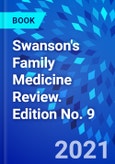-
Uses�realistic case problems�as a basis for questions on diagnosis and management, with�detailed answers�that explain both correct and incorrect responses.��
-
Prepares you for the ABFM's�Certificates of Added Qualifications�(CAQs) in adolescent medicine, geriatric medicine, hospice and palliative medicine, pain medicine, sleep medicine, and sports medicine, as well as the upcoming CAQ in hospital medicine.��
-
Reflects�meticulous updating for accuracy and complete coverage, including more questions in key areas for newer CAQs.�
-
Includes�tips and tricks for passing the board exam, clinical algorithms throughout, summaries at the end of each case, and case management problems that suggest the ideal diagnostic work-up.�
-
Allows you to�earn up to 75 CME Credits�online through Rutgers Robert Wood Johnson Medical School.��
-
Enhanced eBook version included with purchase.�Your enhanced eBook allows you to access�all of�the text, figures, and references from the book on a variety of devices, as well as�answer questions interactively and check your answers�on any electronic platform.
Table of Contents
Part One: Principles of Family Medicine
1. The Family Physician
2. The Patient-Centered Medical Home
3. Psychosocial Influences on Health
4. Care of the Elderly Patient
5. Care of the Dying Patient
6. Care of the Self
7. Preventive Health Care
8. Behavioral Change and Patient Empowerment
9. Interpreting the Medical Literature:� Applying Evidence-Based Medicine in Practice
10. Information Technology
11. Clinical Problem Solving
12. Integrative Medicine
13. Establishing Rapport
14. Interpreting Laboratory Tests
Part Two:� Practice of Family Medicine
15. Infectious Diseases
16. Pulmonary Medicine
17. Ophthalmology
18. Otorhinolaryngology
19. Allergy
20. Obstetrics
21. Care of the Newborn
22. Growth and Development
23. Behavioral Problems in Children and Adolescents
24. Child Abuse
25. Gynecology
26. Contraception
27. Cardiovascular Disease
28. Common Office Procedures
29. Sports Medicine
30. Common Issues in Orthopedics
31. Neck and Back Pain
32. Rheumatology and Musculoskeletal Problems
33. Dermatology
34. Diabetes Mellitus
35. Endocrinology
36. Obesity
37. Nutrition
38. Gastroenterology
39. Hematology
40. Urinary Tract Disorders
41. Neurology
42. Human Sexuality
43. Clinical Genomics
44. Crisis Intervention, Trauma, and Disasters
45. Patients with Personality Disorders; Difficult Encounters
46. Anxiety and Depression
47. Delirium and Dementia
48. Alcohol Use Disorders
49. Nicotine Addiction
50. Substance Use Disorders








